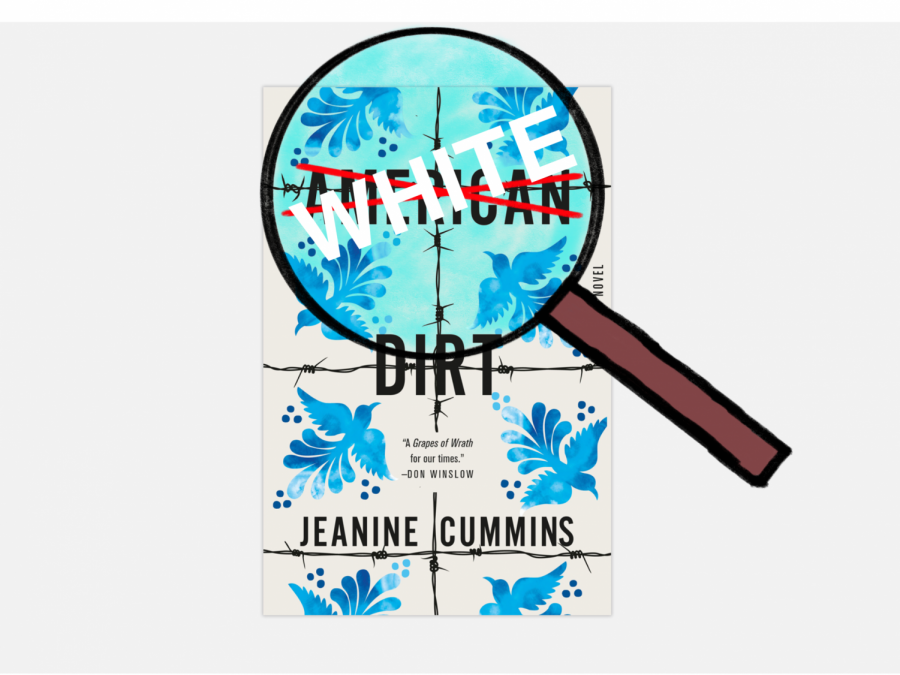The Tide’s View: ‘American Dirt’ unearths white ignorance
Graphic by Aries Wang; Photo by Emily Zhao
“American Dirt” by Jeanine Cummins, published on Jan. 21, describes the journey of an undocumented immigrant in America.
March 9, 2020
Released on January 21, “American Dirt” by Jeanine Cummins was an immediate success, receiving major praise from literary critics and even becoming Oprah’s book club pick. The story, coming at a sensitive time in politics, tells the tale of a mother and her son escaping the drug cartel-infested city of Acapulco, Mexico. Despite its skyrocketing popularity and a whopping 491 holds in the Montgomery County Public Libraries system, the book has received significant backlash from Latinx readers who claim that it repackages and whitewashes the story of Mexican immigrants. Not only is the book unoriginal and generally boring, but the author blatantly disrespects the Mexican immigrant story which belongs to Mexican writers, who are severely underpaid despite telling more accurate versions of migrant stories.
Cummins, who officially identifies as white, claimed she aimed to represent the masses ignored by the literary world. True, the Mexican migrant story is relevant to our modern world, but that does not mean that Cummins, who has never lived even within 500 miles of the border, is the right person to tell it. The belief that a story about minorities needs to be by a white author to be popular is toxic and reveals the underlying issue on who we consider “talented.”
After reading reviews by Ignacio Sanchez Prado, a professor of Latino and Mexican Studies, and Jaime Espinoza, whose family illegally immigrated from Mexico, it is immediately clear that there is a gross misrepresentation of an immigrant’s journey.
For instance, the mother has difficulty obtaining a legal birth certificate for her son. We, and likely other non-Mexican readers, did not question this fact while reading. However, in Prado’s review, he explained, “In Mexico, a citizen can go online and request a birth certificate and print it. This certificate is of legal value.”
Even for a non-Mexican reader, some of the author’s choices in the book were laughable like a shooting at a quinceñeara in the first chapter and the ridiculous sprinkling of Spanish words like “Hello, Abuela.” Cummins’ depiction of the drug-infested and violent neighborhoods might have a shade of truth, thanks to her “five years of research,” but they also feed negative stereotypes about Mexico—similar to President Trump’s xenophobic speeches.
The controversy around American Dirt brings light to a much greater issue: the merit of authors writing stories that are not their own—especially in literary genres focusing on cultural or societal oppression.
In a time when we are beginning to discuss the diversity of individual experiences, it should naturally follow that our books do the same. Unfortunately, reality is extremely different: The Guardian reported in 2016 that, “the vast majority of books published are by white authors and about white characters,” and a survey of American publishing companies found their staff to be predominantly white.The sad truth is, when they give a seven-figure advance for Cummins’ book, they are depending on a loyal American, white readership who flocks for melodramatic action with two-dimensional characters.
While authors such as Cummins attempt to tell the stories of others through research and interviews, the simple reality is that the experience of an outsider will never match a lifetime of first hand exposure. Furthermore, the prevalence of privileged authors writing about experiences of the oppressed and succeeding, while less privileged authors fight just to get their foot in the door of in the publishing world, continues the dangerous narrative that allows the oppressors to profit off the experiences of the oppressed—a trend rooted in centuries of problematic history. Though writers should not be prohibited from writing on any topic, the authors with the closest connections to the main topics in a book—in this case, Latinx authors writing stories about migration—must be provided the resources and opportunities to successfully tell their story.
Even though we, as readers and consumers, cannot immediately change the demographics of the publishing world, we still hold the potential to change this narrative through the books we choose to read and publicize. By actively promoting marginalized authors writing about their own experiences, we can improve the potential for not only increased diversity in the book industry, but also reader awareness of the struggles that others face. We choose the books that become timeless.


